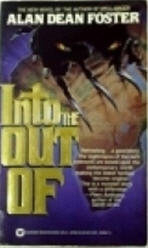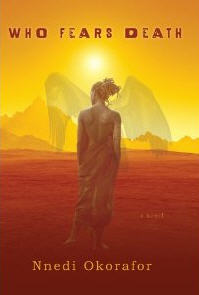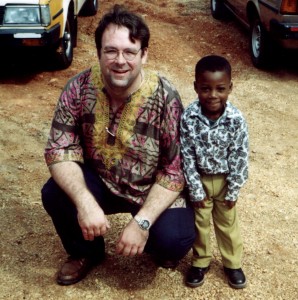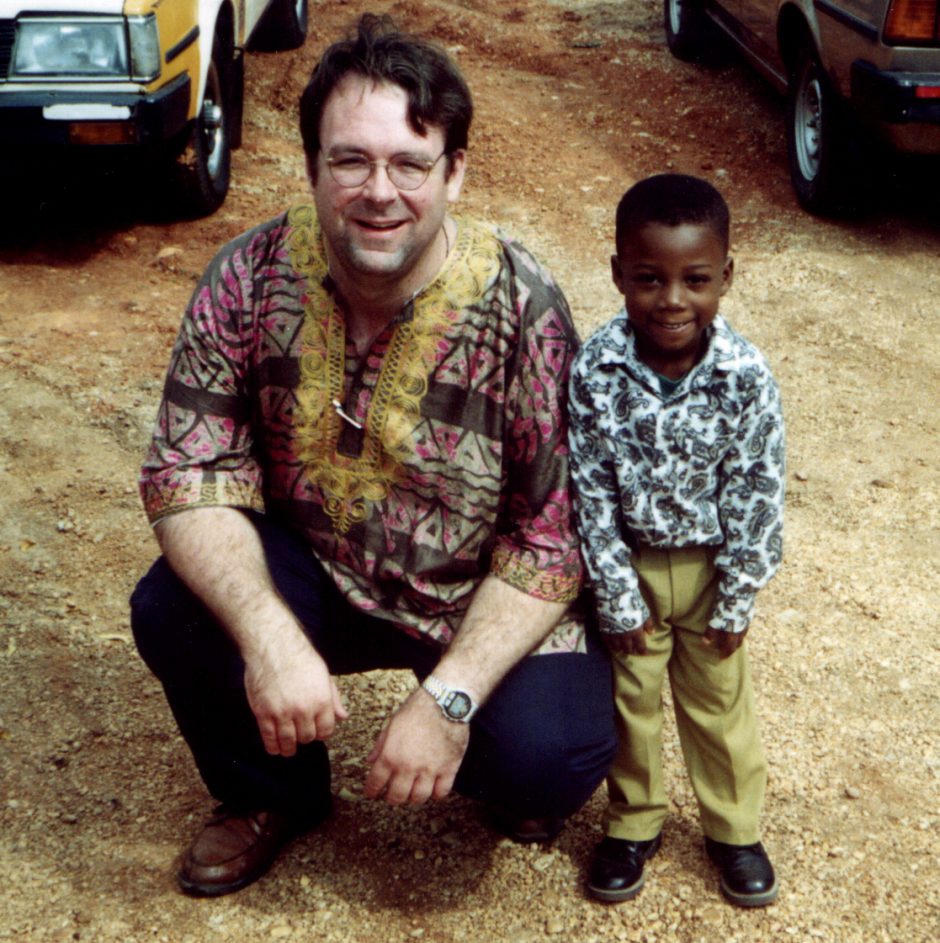 I’ve often called Mike Resnick a friend and mentor. And recently as he was honored at ChiCon as Guest Of Honor, I’ve gone back and revisited some of the works of his which have most inspired me. I was not a longstanding Resnick fan. In fact, I barely knew who he was when I read a review in The Magazine of Fantasy and Science Fiction comparing various speculative fiction stories which made use of other cultures. Discovering Mike’s passion for Africa and success with stories inspired by it, I looked him up and emailed him about my passion for Africa. The next thing I knew he’d sent me files of all of the stories and I began to read. Then we opened a dialogue that launched me into my Resnick discovery. What I admire so much about Mike’s use of African characters and culture is that unlike so many Westerners he seems to find value in their dedication to traditions and their passion for their traditional ways, while still recognizing some of the weaknesses and failings which have resulted. He’s done a remarkable job of writing characters who feel authentic without making them look silly or backward but leaving it up to us to decide who deserves admiration and who doesn’t. In his trilogy of Chronicles Of A Distant World—Paradise, Inferno and Purgatory–he used African history and political events as the inspiration for planetary colonization, getting inside the minds of alien races as well as human colonists and, in the process, wound up predicting some events which happened in real African history in the cultures he used for inspiration. I think, like me, Resnick has seen the value of observing a culture without making snap judgements based on our own presuppositions and he has sought to present those cultures in a respectful light despite any obvious failings.
I’ve often called Mike Resnick a friend and mentor. And recently as he was honored at ChiCon as Guest Of Honor, I’ve gone back and revisited some of the works of his which have most inspired me. I was not a longstanding Resnick fan. In fact, I barely knew who he was when I read a review in The Magazine of Fantasy and Science Fiction comparing various speculative fiction stories which made use of other cultures. Discovering Mike’s passion for Africa and success with stories inspired by it, I looked him up and emailed him about my passion for Africa. The next thing I knew he’d sent me files of all of the stories and I began to read. Then we opened a dialogue that launched me into my Resnick discovery. What I admire so much about Mike’s use of African characters and culture is that unlike so many Westerners he seems to find value in their dedication to traditions and their passion for their traditional ways, while still recognizing some of the weaknesses and failings which have resulted. He’s done a remarkable job of writing characters who feel authentic without making them look silly or backward but leaving it up to us to decide who deserves admiration and who doesn’t. In his trilogy of Chronicles Of A Distant World—Paradise, Inferno and Purgatory–he used African history and political events as the inspiration for planetary colonization, getting inside the minds of alien races as well as human colonists and, in the process, wound up predicting some events which happened in real African history in the cultures he used for inspiration. I think, like me, Resnick has seen the value of observing a culture without making snap judgements based on our own presuppositions and he has sought to present those cultures in a respectful light despite any obvious failings.
[My brief reviews of several such Resnick books can be found as follows: Kirinyaga, Inferno, Purgatory, Ivory.]
Resnick is not the only author to dabble in African storytelling, of course, Nigerian-American Nnedi Okorafor has used her culture in her writings extensively and Alan Dean Fosters’s Into  The Out Of makes great use of African cultures as well. Writers like Paolo Bacigalupi and Jason Sanford have used their own crosscultural experiences with Asian nations in their writing, and Lucius Shepard is well known for his stories of Latin American culture. I myself just had a short story published that employed US-Mexico border culture. And I think these kinds of explorations are rich fodder and rife with the opportunity to break away from traditional storylines and tropes. One of the great advantages for writers of world travels is the opportunity to get inside the heads of those who see the world very differently from how we see it ourselves, study their traditions, customs, ideas, etc. and find inspiration for writing more complex and interesting and nuanced tales. You don’t have to agree with a point of view to get inside the heads of those who hold it. You do have to respect their right to have their own beliefs though, I think. And perhaps that’s where the challenge lies today, particularly here in the United States where ideological political differences more often divide and destroy respect rather than encourage it. It’s hard to accept those with whom we strongly degree, it seems. And media and pundits work hard to keep it that way.
The Out Of makes great use of African cultures as well. Writers like Paolo Bacigalupi and Jason Sanford have used their own crosscultural experiences with Asian nations in their writing, and Lucius Shepard is well known for his stories of Latin American culture. I myself just had a short story published that employed US-Mexico border culture. And I think these kinds of explorations are rich fodder and rife with the opportunity to break away from traditional storylines and tropes. One of the great advantages for writers of world travels is the opportunity to get inside the heads of those who see the world very differently from how we see it ourselves, study their traditions, customs, ideas, etc. and find inspiration for writing more complex and interesting and nuanced tales. You don’t have to agree with a point of view to get inside the heads of those who hold it. You do have to respect their right to have their own beliefs though, I think. And perhaps that’s where the challenge lies today, particularly here in the United States where ideological political differences more often divide and destroy respect rather than encourage it. It’s hard to accept those with whom we strongly degree, it seems. And media and pundits work hard to keep it that way.
But for me, an upper middle class doctor’s kid, spending time in African cities and tribal villages and Brazilian cities and slums, etc. has made me see the world as a much bigger place than I ever could have imagined before those experiences. It’s widened my box and my lens and allowed me to ask questions I wasn’t accustomed to asking and even consider options which might not have occurred to me before 2000 when I started my world travels. I find some of the customs and attitudes I encounter in these places to be frustrating and misinformed, yes, but I also find some of them inspiring and worthwhile. There are many things of value we could learn from each other if we just took the time. For example, the unity of African community is something that would benefit us greatly in the West. I blog about it here and how much I think we could learn from their sense of oneness and unity. Their focus on conversation and hanging out represents another lost opportunity. Africans love to spend their evenings not in front of the TV, but gathering with neighbors and friends to discuss news, weather, life, work, the universe and everything in between. Even when they do watch television or movies, they invite people to join them. I rarely saw them sitting around alone doing such activity. Life is a communal experience. Africans seem to find joy in the little things and lack of things which we take for granted as well. It was a stunning reminder to me that those who have often lose appreciation for their condition and that those who are accutely aware of their lack often have a freedom we lack.
 This is why what Apex and Lavie Tidhar have done with their Book of World SF anthologies is so important. There are other ways to see the world through the specfic lens, and by taking the time to see them, we can learn a lot about ourselves which we’d never expected and might not see any other way. We can also discover possibilities for viewing the world which never occurred to us. People operating with different experiences, assumptions and histories tend to view the same situations through different eyes. And there are few things better for teaching us how to write diverse and real characters with truly different points of view than seeing the world through the eyes of real people with such varied points of view. Admittedly, what we see isn’t always going to be pleasant. But then the nihilistic trends of the media and much fiction have left behind the happy ending fairy tales of our youth anyway. Those open to the possibilities of positives will find them, while those focused primarily on negatives will not. It’s not even that one should want to or have to write characters of different cultures as much as getting inside the heads of people who push us outside our stereotypes and go-to ideas so that we can write something different than we might have before. Resnick, Okorafor, Foster, and others have done this quite well, which is why, looking back at their work now, I am reminded how much difference it can make for writers to take the time to experience such things for themselves.
This is why what Apex and Lavie Tidhar have done with their Book of World SF anthologies is so important. There are other ways to see the world through the specfic lens, and by taking the time to see them, we can learn a lot about ourselves which we’d never expected and might not see any other way. We can also discover possibilities for viewing the world which never occurred to us. People operating with different experiences, assumptions and histories tend to view the same situations through different eyes. And there are few things better for teaching us how to write diverse and real characters with truly different points of view than seeing the world through the eyes of real people with such varied points of view. Admittedly, what we see isn’t always going to be pleasant. But then the nihilistic trends of the media and much fiction have left behind the happy ending fairy tales of our youth anyway. Those open to the possibilities of positives will find them, while those focused primarily on negatives will not. It’s not even that one should want to or have to write characters of different cultures as much as getting inside the heads of people who push us outside our stereotypes and go-to ideas so that we can write something different than we might have before. Resnick, Okorafor, Foster, and others have done this quite well, which is why, looking back at their work now, I am reminded how much difference it can make for writers to take the time to experience such things for themselves.
When I spent time volunteering in prisons, I came away telling people that everyone should go and experience that for themselves because “the inmates are a lot more like us than you’d imagine.” For me, it was a scary and yet sobering reminder that human beings no matter their backgrounds, etc. have more in common than different. The same held true of my experiences in other cultures. I tell everyone to visit a developing world country at least once. See for yourselves what you’ve only imagined from the pages of National Geographic or TV specials about starvation, etc. Go there and experience it and be forever changed. If you’re not changed, you’re doing something wrong. I don’t see how you couldn’t be. Don’t fear this kind of change. It’s the good kind–the kind that makes you smarter, wiser, more aware and more appreciative. It’s the kind that makes you a better person and inspires you to write better stories and live better lives. That kind of change can’t be a bad thing, can it?
I’m grateful that writers I admire have taken the time to make use of those lessons and changes from their own lives. I only hope that I and others can do a better job of it in the future, for there are great stories that deserve to be told, waiting to be told, waiting to be discovered. And there’s a far richer tapestry than we often remember with which we can tell those stories. In a genre where it’s often said “there are no new ideas, only new ways of telling them,” it’s hard to pass up any chance to broaden one’s storytelling horizons and toolbox, isn’t it? I know it has been for Mike Resnick, Alan Dean Foster, Nnedi Okorafor and for me.
For what it’s worth…

Bryan Thomas Schmidt is an author and editor of adult and children’s speculative fiction. His debut novel, The Worker Prince(2011) received Honorable Mention on Barnes & Noble Book Club’s Year’s Best Science Fiction Releases for 2011. A sequel The Returning followed in 2012 and The Exodus will appear in 2013, completing the space opera Saga Of Davi Rhii. His first children’s books, 102 More Hilarious Dinosaur Books For Kids (ebook only) and Abraham Lincoln: Dinosaur Hunter- Lost In A Land Of Legends (forthcoming) appeared from Delabarre Publishing in 2012. His short stories have appeared in magazines, anthologies and online. He edited the anthology Space Battles: Full Throttle Space Tales #6 (2012) and is working on World Encounters and Space & Shadows: SpecNoir with coeditor John Helfers, both forthcoming. He hosts #sffwrtcht (Science Fiction & Fantasy Writer’s Chat) Wednesdays at 9 pm ET on Twitter and is an affiliate member of the SFWA.

